Tagged: theatre
What's your relationship with your parents like?
- by Alyson Shane
If you're like me, or even like a lot of other people out there, then you probably have a somewhat complicated relationship with your parents.
These conflicts and complications happen because dynamics are difficult to navigate; it's hard to be emotionally connected and love someone who may be vastly different from you, or who hurts you, confuses you, or struggles to connect with you emotionally.
As children, it falls on our shoulders to try to understand and unpack our parents:
What decisions and life experiences led them to this place in life?
How did these experiences shape their personalities and parenting style?
What can we do to bridge the gap between their values and beliefs, and those of a new generation?
(I think about these things a lot, in case you haven't noticed.)
Someone else who clearly thinks about these things a lot is Tetsuro Shigematsu, the performer behind the play Empire of the Son, which is currently playing at the Prairie Theatre Exchange.
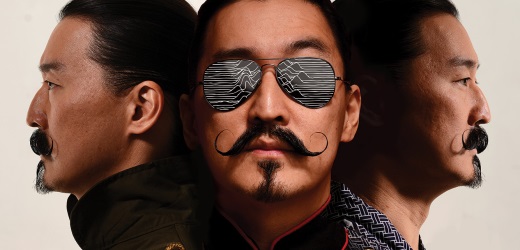
Image via the Prairie Theatre Exchange
Empire of the Son is a one-man show written and performed by Tetsuro Shigematsu (former host of CBC Radio One’s The Roundup) which employs a variety of mediums from monologues, to video, recorded audio, to live-action video using miniature sets, and more, to explore the complex relationship between himself and his father, also a CBC broadcaster.
Or, as the poster so aptly put it: Two Generations and the Silence Between Them (how perfect is this description, by the way?)
The play focuses on Shigematsu's emotionally distant father, Akira, and his struggle to reconcile his father's lasting impact through his work as a radio broadcaster for the BBC and CBC, and how emotionally distant and reserved he was with his family.
I'll be honest: I typically have a hard time getting into one-man shows as I tend to find the disconnect when an actor switches between characters to be rather jarring, but there was a distinct physical difference between when Shigematsu was "Tetsuro" and when he was acting as "Akira" that may have turned me into a one-man show convert:
Shigematsu's impressions of his father seemed to take over his whole body; his posture changed, his facial expressions changed, and his inflection and pronunciation were so dramatically different from the jovial person telling the story that it often felt like there was another person onstage, entirely.
At the same time, you could tell that these impressions, and his ability to deliver them so effectively, were crafted with the kind of love and intimate knowledge that only very close family members and friends tend to have with one another.
As Shigematsu led us through his father's life we came to understand the contradiction he felt about his father: for someone who broadcasted to the world and regularly talked to people across the globe, he struggled to open up to and connect emotionally with his own children.
It's revealed that though his father was an influential figure and led a storied life which included some astounding moments (having tea with the Queen, being present in the room when Marilyn Monroe serenaded JFK, and - most notably - being in Hiroshima when the atomic bomb was dropped) Shigematsu only began to 'real' conversations with his father when he began interviewing him towards the end of his life.
This contrast hit home, and served as a reminder that, often, the most we know of previous generations is what they choose to share, and unless we take the time to tease it out of them, their stories and experiences may be lost forever.
(As someone who studied oral history in university, I found this fascinating, by the way.)
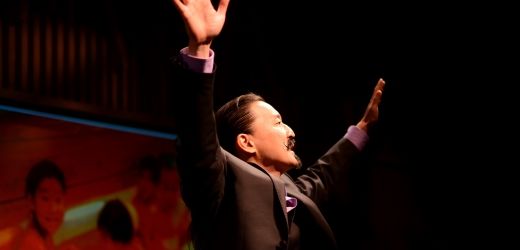
Image via the Prairie Theatre Exchange
This intimate solo performance was enhanced by Shigematsu's larger-than-life stage presence and his interesting use of a camera and miniature props located on a long table onstage. A DSLR camera (I think) was strapped to it, and at times Shigematsu would move casually over to the table, arrange some of the tiny props, and stream the live video camera footage to the screen behind him.
If this sounds strange, it was - but that only enhanced how effective this method of adding an additional visual layer was to the overall story. Personally, I've never seen someone manage to imitate two different people and move around on a miniature skateboard with just their middle ad index fingers, have you?
At the outset of the performance Shigematsu shares that he hasn't cried since he was a child, and shared his hope that performing this story in front of an audience would help him do so.
Personally, I shed enough tears for both Shigematsu and myself.
This poignant, captivating and strikingly funny memoir is one that I highly recommend seeing.
Additionally, we were lucky enough to catch Empire of the Son on the night of the Prairie Theatre Exchange's Leap Series, a new event in partnership with Manitoba Music focusing on out-of-the-box plays and music from local artists. If you're looking for a date night, or an opportunity to dive into the world of independent theatre, make sure to check out their next Leap Series event happening in February (and say hi to me if you do!)
**Big thanks to the folks at the Prairie Theatre Exchange for giving me free tickets to see their 2018/2019 season in exchange for these posts. It's a wonderful treat to be able to support and promote Winnipeg's independent theatres.**
Saw the funniest, saddest play the other day
- by Alyson Shane

"Happy Place" is playing at the Prairie Theatre Exchange right now and John and I checked it out on opening night last week. I try not to do any research into the shows before we see them so I don't go in with any expectations, and to date it hasn't done me wrong.
"Happy Place" is a play about a group of women who, for one reason of another, all find themselves in an in-patient centre as a result of various types of trauma.
Based on that description you'd probably expect to cry more than you'd laugh, but I don't know if that's quite the case with this play.
The play begins by introducing Samira, a young woman who starts out being withdrawn and quiet around the other patients, and around their doctor, Louise. Over the course of the play we learn that Samira has been sexually abused, at one point through a gut-wrenching monologue that was, honestly, hard to hear.
Other characters include Mildred, the shit-disturber who provides a lot of the comedic relief through her sassy, no-bullshit personality; Rosemary, who is reserved and somewhat condescending; Kathleen, who has also been sexually abused; Nina, who is tightly-wound and whose psyche feels frayed; and Joyce, who spends most of her time being a nosy busybody who one-ups everyone so thoughtlessly that it almost seems like she does so without thinking.
The set was simple: a raised platform with areas off to the side representing the "rooms" the women stayed in. At first it almost felt too simple, but as the play progressed the use of lighting created a surprisingly dynamic and engaging stage setup.
I feel like "Happy Place" is important for several reasons.
The play explores the various ways women can be abused, manipulated, overpowered, and the deep underlying sense of shame and low self-worth that these experiences breed inside of us.
The short scenes and choppy, fragmented way in which the story was told reminded me a lot of what it was like in therapy: short outbursts of extreme emotion that often left you feeling more empty than whole and fulfilled.
There were several group scenes which stood out, including one where Louise asks the women to create a collage of their "happy place" which - I won't go into too much detail here - but this also hit home in a surprisingly profound way as the characters discussed their reactions to the concept of a "happy place".
I cried so hard while watching "Happy Place" that I started to worry about my mascara and eyeliner giving me raccoon eyes.
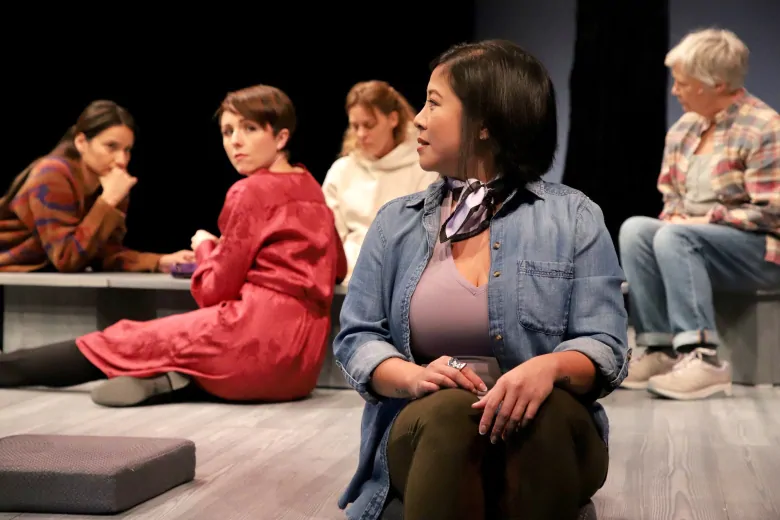
As each of the characters began to process her own trauma, and the role she played in creating or enabling the issue I, and other people in the audience, started to break down.
At one point Joyce, whose constant need to one-up everyone around her had reminded me so much of my mom and my Nan (my mom's mother, ironically also named Joyce) floored me by saying
"I'm not depressed because my husband left me... my husband left me because I'm depressed."
It's not often that a character in a play puts words to your deepest, darkest fear.
I don't think I was quite ready for it. I started crying and had to work to restrain myself from flat-out ugly-crying in the middle of the theatre. I held onto John's hand so tight and saw that he was crying, too.
Most everyone in the theatre was full-on crying by that point, I think.
Which speaks volumes about the play, and its playwright Pamela Mala Sinha. Being able to peel back layers of fear and self-judgment for the things we are ashamed of, or wish we could undo, or forget onstage is a magnificent (if not somewhat off-putting for how personal it felt) feat, and a deeply powerful and moving experience to watch acted out onstage.
"Happy Place" is playing at the PTE until November 25, 2018, and even though I've spent most of this post talking about how sad it was, and how much I cried... that's precisely why you should grab a ticket (or two, it's good to cry with a friend) while it's still playing.
It's not every day that a play touches you as deeply as this one touched me, and based on the sniffling and tissues going around the venue, I doubt I was the only one who felt that way.
**Big thanks to the folks at the Prairie Theatre Exchange for giving me free tickets to see their 2018/2019 season in exchange for these posts. It's a wonderful treat to be able to support and promote Winnipeg's independent theatres.**
Saw Prairie Nurse at the Prairie Theatre Exchange last week
- by Alyson Shane
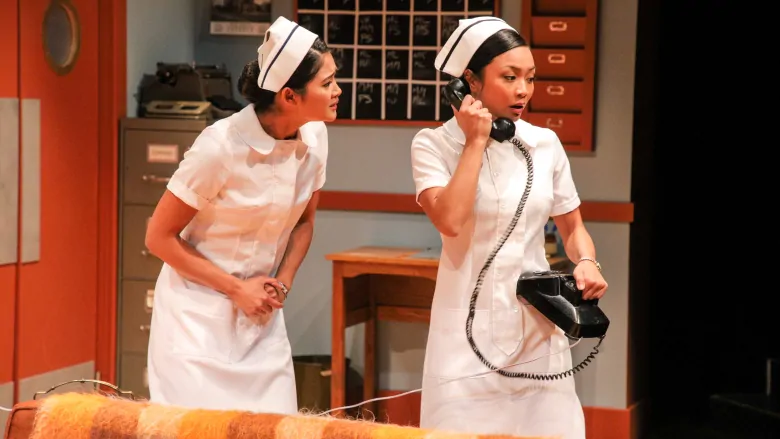
(Photo via Leif Norman)
It's a weird, funny screwball comedy and if you're looking to have an excuse to forget all the weird, messed-up stuff happening in the world right now and have a couple of good belly laughs, then this is the play for you.
I typically try not to do any preliminary research before going to a play at the PTE so I can go in without any expectations, and to date I continue to be pleasantly surprised by the quality of the plays, storytelling, and acting brought to life onstage each season.
The first thing that stood out to me when we sat down for Prairie Nurse was the set: usually plays at the Prairie Theatre Exchange (in my experience, anyway) tend to have more stripped-down sets, and rely on the audience's imagination to fill in the blanks.
Not that I'm complaining, mind you. I enjoyed the set a lot; in particular the lockers and the Formica table set gave everything a weird, home-y feeling. Even though the set was intended to represent the hospital staff room, it did a great job of conveying that this was the space were the characters "lived" when not working in the hospital. I loved it.
The play starts with several of the staff at a hospital in rural Saskatchewan anxiously awaiting the arrival of two new nurses who are moving to Canada from The Philippines.
The plot felt especially pertinent given than Winnipeg is home to one of the largest and most established Filipino populations in Canada, but even though the play tackles a lot of quirks and assumptions that can occur when different cultures clash for the first time, the play does a great job of speaking to anyone who has ever felt misunderstood, or out of place.
The plot of the play follows Puring (short for Purificacion) and Penny (for Indepencia), two women from the Philippines who come to a small-town Saskatchewan hospital to work as nurses during the 1960s.
The recurring problem that the hospital staff have, and what ultimately proves to be one of the major plot devices as well as one of the primary recurring jokes, can't tell the two nurses apart.
Of course, this inability by the hospital staff to tell the new nurses apart results in a variety of silly hijinks
(side note: so happy to finally have an excuse to use the word 'hijinks' in a written sentence on my blog)
which are only enhanced by the slapstick-style action of people entering through one door while someone exits another, jokes about how cold Canada is (of course), mispronunciations, and a variety of other jokes that I won't go into here for fear of spoilers.
One thing that stood out was how quietly the play addressed different, more subtle forms of racism. For example the hospital staff have a hard time telling the conservative and shy Puring, who comes from a rural community, apart from the outgoing Penny, who hails from Manila and has a decidedly more... shall we say, entitled personality.
One of the best characters was actually a supporting one: Dr. McGreggor, a Scottish doctor so obsessed with hunting and fishing that he'd pretty much rather be anywhere else than in the hospital delivering babies and tending to patients.
Overall Prairie Nurse was a charming and touching story not just of overcoming cultural differences, but also of the very human experience of trying to fit into a new place, and or trying to adapt to a changing one.
Prairie Nurse was a really lovely way to kickoff the 2018/2019 play season. I'm excited to see what the Prairie Theatre Exchange does next!
In My Community: Gracie at the Prairie Theatre Exchange
- by Alyson Shane
I have a confession: I'm a little obsessed with The Church of Jesus Christ of Latter-Day Saints and its polygamous culture. Weird, I know, but bear with me.
I grew up in a largely unreligious household; I somewhat recall my mom mentioning Sunday School to me when I was a kid, but her big selling point was hot dog days and camping trips, not a deep, personal connection with some higher power. In fact, the closest I remember getting to any sort of organized religion growing up was seeing The Church of Jesus Christ of Latter-Day Saints (LDS) commercials on the American cable networks.
Partially as a result, I now identify as an Atheist, but that hasn't stopped me from developing a weird obsession with religion, especially the more "fringe" versions of beliefs like Christianity like the Mormon LDS faith. It started with Mitt Romney, the 2012 Republican Presidential nominee who apparently wore magic underwear, and became exacerbated when I started watching the HBO show Big Love, a fictional narrative about an LDS polygamist and his three wives.
I'm fascinated by sub-cultures, so it probably comes as no surprise that I was thrilled to discover that Gracie, the first play in the Prairie Theatre Exchange's new season, is all about Mormons and polygamous relationships.

The Play
At it's core, 'Gracie' is a play about self-discovery, rejection, and acceptance. Written by playwright Joan MacLeod, it follows a young girl from the LDS church as her family moves from America to Canada to live on a polygamous compound in British Columbia.
When we first meet Gracie (played by the incredible Samantha Hill) she's eight years old, sitting in a van with her mother and siblings on her way to their new life in Canada. Her mother is getting married, and when they arrive in their new community they're greeted by a group of individuals: boys on bikes, teenage girls carrying their babies, and her mother's new husband, to whom she will be the 18th wife.
(Please excuse me while I shudder for a moment)
During this introduction Gracie meets a young girl named Allie, and they become fast friends, and throughout the course of the play Gracie grows up right before our eyes. By the second act, which takes place four years later, Gracie and Allie are practicing for the exaltation. At school, Gracie bemoans the fact that she has to learn arithmetic in addition to other subjects like English, "science" and "social studies" where half the class studies Jesus Christ and the other studies Joseph Smith, the founder of the Mormon faith.
During this time Gracie's brother gets a job, and her sisters are both married off and begin having children with their assigned husbands. At this point, during the final segment of the play, Gracie is about to turn 16 - marrying age in her community.
During this time Gracie struggles with her changing feelings about her beliefs, culture, and circumstances, and this one-woman play quickly transforms from charming-yet-unnerving overview of a religious subculture to a moving and powerful story about the complex private lives of LDS women which we rarely see beyond TV shows or court testimonials.
Exploring Perspectives
One of the things that struck me about 'Gracie' was how MacLeod used to play to explore uncomfortable subjects like polygamy, religion, and alternative lifestyles and beliefs in a way which felt nonjudgemental; in fact, the play often felt more like a serving of reality than a heavily-researched theatre production.
As a non-religious person I find it's often all-too-easy to dismiss the complex, three-dimensional experiences of women raised in the LDS church. It's easy to say: if it's so bad, why not leave? but plays like Gracie do a tremendous job of reminding us that everyone is an individual with complex, nuanced views and experiences.
One moment which struck me was when Gracie refers to the 'grannies', groups of older women who protest outside the LDS compound with picket signs, outraged at what they perceive to the atrocities being committed within the community:
"They don't like the way we live even though they know nothing about us," Gracie says.
Complicated Positions
As a non-religious person, I often struggle to understand the appeal and value of religious beliefs, and I appreciated watching a performance which didn't pander to my preconceived notions about the LDS church and polygamy in general.
In fact, the play was so well-written that Gracie's experiences, interpretations, and reactions to the events happening to her family and within her community felt more like reading a young girl's diary than a fictional exploration of an unusual religious subculture.
Though I often felt gut-based reactions to certain experiences (such as her mother being someone's 18th wife, and all of the ways it aggravates and upsets my 3rd wave feminist views of the world), MacLeod does a tremendously good job of exploring Gracie's world in ways which feel authentic and realistic, without the bombast which often accompanies literary works which explore religious subcultures.
Evoking Empathy
If anything Gracie acts as a terrific opportunity to explore a secretive, unusual religious subculture without feeling like a voyeur. While the play presents a myriad of uncomfortable and unusual situations that the modern girl (religious or not) doesn't experience, it does so without judgment; it really does feel like a honest, authentic exploration of one girl's perspective on a community which initially makes sense, but which ultimately she (and we) fail to understand and accept.
Gracie runs at the Prairie Theatre Exchange until October 29th, and I highly recommend catching it before it's gone. Not only is it a tremendously good play, but it's a fascinating and highly entertaining exploration of a lesser-known religious subculture.
In My Community: SPIN (or, I saw the strangest play last night)
- by Alyson Shane
Last night, despite frigid temperatures and hostile winds, John and I trekked out to the Prairie Theatre Exchange to check out the opening night of SPIN, an unusual spoken-word, musical, theatrical oddball of a play featuring a string section, two guitars, a projector, and a bicycle as an instrument.
It was by far the weirdest play I've ever seen, and I totally loved it.
For those of you who don't know me personally, I'm obsessed with riding my bike. I first got into cycling as an adult when the guy I was seeing at the time and I purchased matching his & hers vintage road bikes for $40. They were named Vikki & Vance, and I loved them.
A few years later an unfortunate (car) accident led to me purchasing my current velocipede, Barbara Streisand, whom I now ride all over town the moment the weather allows it. I love cycling; it's an amazingly freeing and fun activity, and there are literally few things that I love more than riding my bike around on a warm day in the sunshine.
So, naturally when I was offered free tickets to see SPIN, a play about cycling, I jumped at the opportunity.
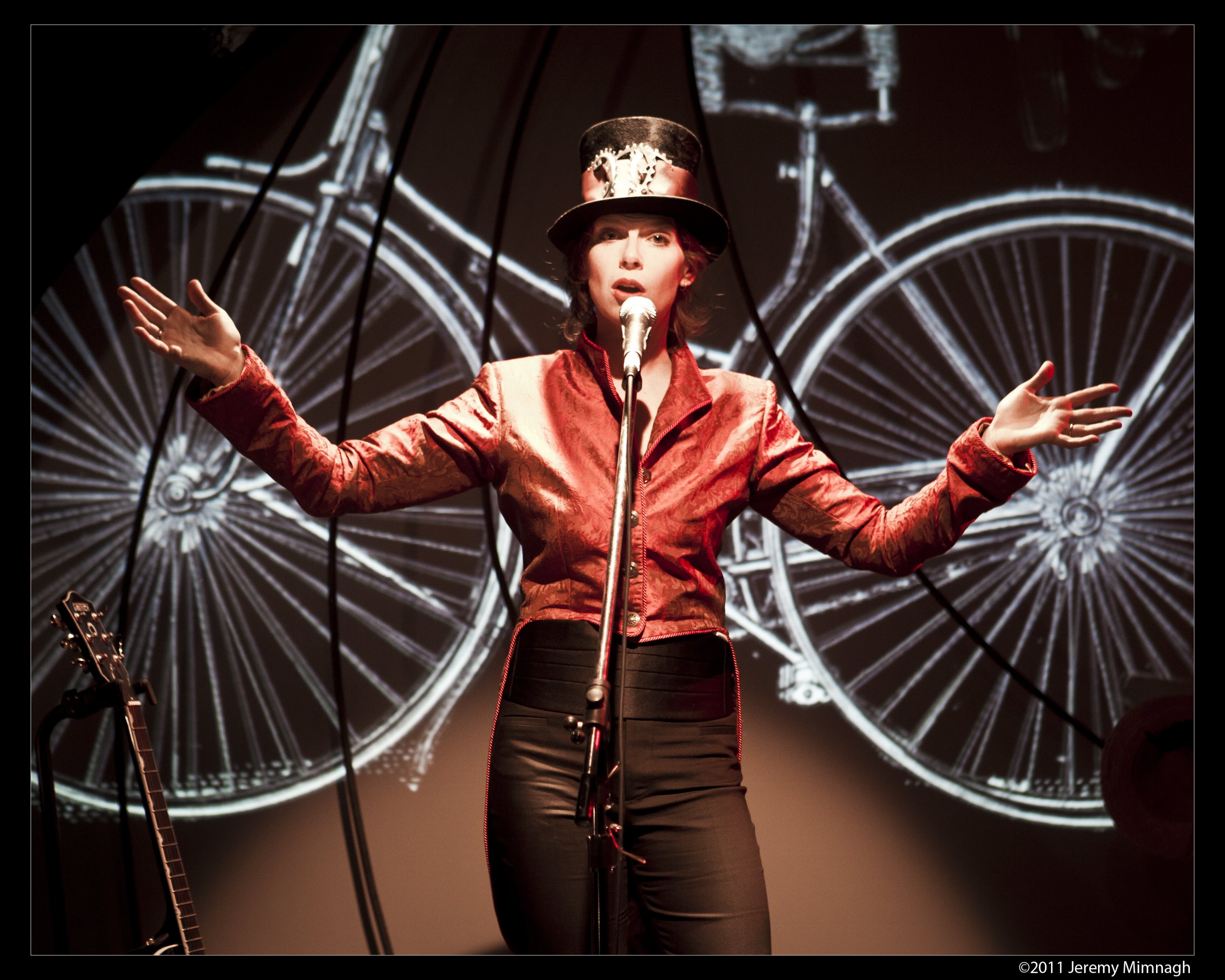
What's so good about a play about the bicycle?
What I didn't know about the bicycle before attending the play was this: the bicycle, in fact, was an important instrument for social change during the women's suffrage movement.
At the opening of the play, which is sort of a mash-up of ballads, catchy songs, and spoken-word pieces, Evalyn Parry emerges and does an impressive recital of Instructions on Learning to Ride a Bicycle, a pamphlet published by Miss Frances Willard, one of the most important suffragettes in history. After learning to ride a bicycle at 51 years old, she was so taken with this efficient mode of self-transportation that she wrote a pamphlet about it, declaring that "all women must all learn to ride, or fall into the sluiceways of oblivion and despair."
Wow. It definitely puts getting on my bike and rollin' around town feel a little less frivolous.
Not only are the stories that Parry weaves together hilarious, fascinating, and inspiring, but her vocals and guitar are backed up by... you guessed it, a bike. Brad Hart, Parry's accompanist who sports a fitting handlebar moustache, literally brings a vintage CCM bicycle to life by playing it like an instrument, suspended on a stand and connected to contact microphones.
The variety of sounds Hart can produce on a bicycle is, to say the least, a little mind-blowing. By using a combination of drum sticks, tuned bells, the spokes, frame, seat, and even the wheels themselves, he adds a unique and fitting element to Parry's songwriting.
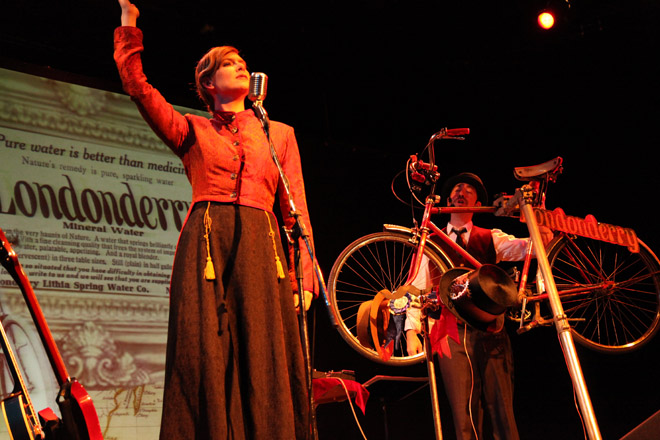
The bicycle as an instrument of social change
SPIN is inspired in part by the amazing true story of Annie Londonderry, the first woman to ride around the world on a bicycle in 1894. Not only was 23 year old Annie Londonderry (not her real last name, Londonderry Lithia was a mineral water manufacturer who sponsored her ride) unusual in that she accepted this unusual challenge, leaving her three kids and husband behind in Boston, but what I found striking (and ingenious) was that she scheduled press events everywhere she went. She sold advertising space all over her clothes and her bike - what a hustler!
This is just one of the examples that Evalyn Parry uses to illustrate how important the bicycle became to women in the late nineteenth century; for the first time ever women had a quick, easy, and most importantly an independent method of getting around.
The bicycle did more than just give ladies a way to get around, however: it also changed the way that we dressed. Using Annie Londonderry as an example of this sartorial shift, Parry paints a hilarious scene of Londonderry riding into a city and blowing people's minds with her masculine attire and her penchant for not giving a damn about it, thank you very much.
"Taking your life into your own hands"
One of the recurring themes throughout the play is the idea that the rider is connected to the bicycle, and that it allows them the freedom to go where they want, whenever they want, on their own terms. Parry weaves the idea of using your heart to move yourself around on your bike, and the idea that the bicycle and all it represents is connected to you as you ride around, beautifully.
"Taking your life into your own hands" also has a double meaning, referring to the suffragette movement and women's rights. As Parry points out throughout the play women's rights are the result of women "taking their lives into their own hands" and not allowing it to be dictated by men, and that the bicycle was one of the first ways in which women were able to start asserting their own independence in stodgy Victorian society.
Two-wheeled words/to wield words
To be honest, when I agreed to see the play I didn't quite know what I was signing up for, but I certainly didn't expect a cabaret-style, spoken-word/musical history lesson on women's rights featuring a bicycle as a backup instrument.
More importantly, however, SPIN made me appreciate what it means to be able to put on my pants and hop on my bike to go do whatever I please. As a woman who gets to enjoy a lifestyle which is a direct result of the hard work of so many women before me, it felt good to have the opportunity to develop a deeper appreciation for something that I already love so much (cycling).
In fact, I was so impressed by the play that it made me want to pull Barbara our, slap some giant winter tires on her, and ride that girl all around town. And in the middle of a frigid Winnipeg winter, that's saying something.
SPIN runs at the Prairie Theatre Exchange until January 31st. Grab your tickets here.
baby you know if I could be anything at all
- by admin

I'd be an actor in musical theatre production like ASSASSINS! which I saw last week while out on a fun friday night date.
okay yeah sure being a surgeon would be ballin, cuttin' people open and saving lives and stucking my hands into their warm, squishy inside parts.
and taking people skydiving would be cool, strappin' 'em to me and being like 'we're falling out of this plane right away, you scurred?' and then jumping like a boss.
but honestly all I wanna do
is sing and dance and tell a little story
and move some people a couple nights a week.
problem is
I can't sing
or dance
so I'll have to stick to writing a wicked blog instead
while secretly listening to broadway jamz in my earbuds
dreaming of the stage.
sigh.
just made a scene at work
- by admin

kinda.
one of the good things about my work is that I get to do a lot of cool stuff like go on lunch excursions and help throw massive 500-person events and bring in entertainers and stuff.
today we brought in a group of improv performers who would 'act out' a story that an audience member told. it's pretty cool, actually.
except when it's my turn.
most people I know wouldn't believe me but public speaking freaks me out.
especially when I'm unprepared.
(mostly when I'm unprepared)
like when I'm sitting in a room with twenty people and they're all urging me to tell a "funny story" and I'm trying to politely decline and they're all going
alyson yr so funny. tell us a funny story alyson.
fuck.
so on the spot I ramble some lame and completely unfunny story because who can come up with a funny story on the spot?
not me I tell you.
and halfway through I realize 'shit this isn't funny. this isn't even a good story'

and I feel the shakes and redness and wobbly voice kick in
and of course the woman running the improv group is doting on me because she can tell that I'm getting anxious and telling me what a good job I'm doing and
she keeps focusing on me and putting her hand on my shoulder which is making it worse because her weird clammy hand is on my skin and
they're going through the motions improv-ing this horrible story which is just making it worse because it's not funny and I can feel myself getting redder and redder and I'm playing with my rings and my fingernails and anything I can pick at or twist
and of course I can't just leave. getting up and walking out would just make it worse so I tell myself
just sit through it. it'll be over soon.
and then omg the woman is kneeling in front of me telling me how it's okay and how I'm 'such a sport' for sharing and just
no. fuck off. you're making it worse. go dote on someone else
I want to yell. but I don't because it's work and it's not polite to yell at the improv lady so I don't
I sit there twisting my ring and my hair and feeling my face flush bright red
waiting for this horrible experience to end.
now I remember why I hate improv.
